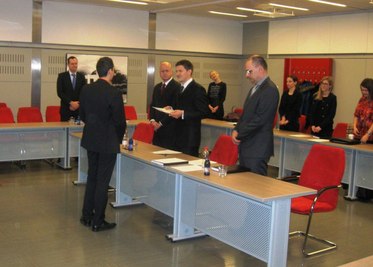
I just received my PhD from Faculty of Economics University of Ljubljana on February 7th 2013. It was a day to remember!
The dissertation is entitled "A multi-level approach in examining non-technological innovation".
Here's its conclusion: This dissertation demonstrates the importance of referring to multilevel theory for non-technological innovation research and taking a multilevel perspective to examine its content, context, and predictors. No single-level perspective can adequately account for organizational behavior that underlies non-technological innovation. The macro perspective neglects the means by which the individual behavior, perceptions, affect, and interactions shaping individual creativity and innovation give rise to higher-level management and technological innovation. Organizations do not behave; people do. In contrast, the micro perspective disregards contextual organizational and country-level factors that can significantly constrain the non-technological innovation processes and outcomes.
On the basis of my research, it is safe to say that future theoretical or empirical models of non-technological innovation should benefit from adopting a multilevel perspective. This approach bridges the gap in different disciplines, and implements insights and advancements from diverse aspects. From a practical perspective, managers and organizations should benefit from a more precise understanding of both individual and contextual influences in constructing work environments that could ultimately foster creativity and innovation at individual, group, or organizational levels.
“Understand the whole and keep an eye on the parts” (Kozlowski & Klein, 2000, p. 53).
The dissertation is entitled "A multi-level approach in examining non-technological innovation".
Here's its conclusion: This dissertation demonstrates the importance of referring to multilevel theory for non-technological innovation research and taking a multilevel perspective to examine its content, context, and predictors. No single-level perspective can adequately account for organizational behavior that underlies non-technological innovation. The macro perspective neglects the means by which the individual behavior, perceptions, affect, and interactions shaping individual creativity and innovation give rise to higher-level management and technological innovation. Organizations do not behave; people do. In contrast, the micro perspective disregards contextual organizational and country-level factors that can significantly constrain the non-technological innovation processes and outcomes.
On the basis of my research, it is safe to say that future theoretical or empirical models of non-technological innovation should benefit from adopting a multilevel perspective. This approach bridges the gap in different disciplines, and implements insights and advancements from diverse aspects. From a practical perspective, managers and organizations should benefit from a more precise understanding of both individual and contextual influences in constructing work environments that could ultimately foster creativity and innovation at individual, group, or organizational levels.
“Understand the whole and keep an eye on the parts” (Kozlowski & Klein, 2000, p. 53).
 RSS Feed
RSS Feed
